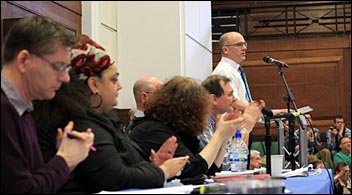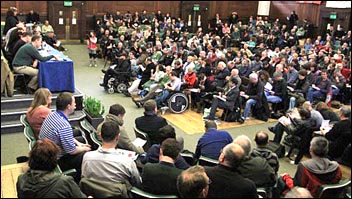What we think
Pensions dispute: Everything is still to fight for

PCS left Unity meeting: Organising to step up the pensions struggle , photo Senan
The open organising conference on Saturday 7 January, hosted by PCS Left Unity, the left in the largest civil service union, could prove to be a very significant moment in the public sector pension struggle.
It was addressed by PCS general secretary Mark Serwotka, left Labour MP John McDonnell, Padraig Mulholland vice-president of the Nipsa Northern Irish public sector alliance, Roger Bannister, from the national executive (NEC) of Unison speaking in a personal capacity, Mark Campbell, UCU lecturers union NEC, Zita Holbourne, Barac black anti-cuts activist, Kevin Donnelly from Unite’s United Left group, Kevin Courtney, National Union of Teachers deputy general secretary and John McInally, PCS vice-president. There was also discussion from the floor.
The conference came the weekend before the PCS and NUT national executive meetings, Unison’s health and local government service group executive meetings, Unite’s local government national industrial sector committee and lastly, the TUC General Council. The conference has acted like a lever in galvanising the most prominent left forces in the movement to build pressure so that the unions reject the government’s offer enshrined in the ‘heads of agreement’ and set the next strike date. Fundamentally all that is ‘on offer’ is what the unions were fighting when they went on strike on 30 November: pay more for your pension, work longer, get less.

PCS left Unity meeting: Organising to step up the pensions struggle , photo by Senan
The timing of the event was crucial but the lack of time and money after the festive period makes the turnout, of up to 550 over the day, with at least 470 registering, even more impressive. The make-up of the audience lends a huge amount of credibility to both the conference and the temporary coordinating committee that has been established. All the main left organisations across the union movement were present. Behind these groups lie the hopes, aspirations and anger at the thought of the momentum built up by N30 being wasted by leaders such as Unison general secretary Dave Prentis and TUC leader Brendan Barber.
The conference also reflected the authority of PCS Left Unity for activists in PCS and beyond. Socialist Party members have played a crucial role over decades in establishing and developing this position, which now has significance far wider than PCS.
It was unfortunate that the SWP-inspired ‘Unite the Resistance’ have organised a duplicate event a week later in the same venue. Many of those attending on Saturday expressed their frustration at this step. It also exposes a lack of understanding about what the PCS Left Unity meeting represents for the pension struggle and the left in the unions in general. In contrast, the National Shop Stewards Network not only didn’t consider organising such a rival event but put its full resources behind building for the 7 January conference.
Even before Saturday it is clear that the campaign had helped to create a momentum by stiffening up the resistance and giving confidence to the best activists in the various unions. Before Christmas, the PCS had stood virtually alone in outright rejection of the deal but by the weekend the NUT, NASUWT and Unite in health had explicitly refused to sign. On Monday 9 January Unite in local government joined the ‘rejectionists’. However, it’s what happens later this week that will prove decisive.
The Unison and TUC leadership are desperate to consolidate the position that they ended last year on with the signing of the heads of agreement. They plan to kick the dispute into the long grass by setting up a protracted negotiation, which it’s not even clear at which point members will get the chance to vote on. There are huge dangers in this because the government plans to bring in the pension changes for the vast majority of public sector workers at the end of March. But, even if the Unison Service Group Executives (SGEs) vote to endorse the sign-up, activists must fight for the right of the million Unison members who went on strike on N30 to decide whether the union stays in this struggle or not.
If Unison and the GMB sign up to the deal, it clearly poses the conduct of the pension dispute in a new light. There should be an immediate call in these unions for recall conferences at national and group/sector level. There should be calls for debates at workplace, town and city level, in front of the members to pressurise the leadership.
But there should also be an immediate meeting of those unions who have refused to sign up to raise the need for a sober discussion of tactics to be employed if a smaller number of unions remain. Despite some criticism from others on the left on Saturday, it was correct for Mark Serwotka to raise the need for a sober discussion on the best tactics to be employed if just one or two unions remained in the pensions fight. It is clear that the government aims to isolate and weaken the PCS. In that situation it would be crucial that the leadership of the PCS employs tactics that will keep its fighting force intact for future battles.
However, the unions that have already rejected the deal still number up to a million members, more than went on strike on 30 June (J30). This creates the possibility of a further coordinated strike being urgently called. As with J30, it could be used as a lever on the unions who have accepted the deal.
Everything is still to fight for. Saturday’s conference showed that despite the well-laid plans of the right-wing union leaders, they will have the fight of their lives from their own members if they want to follow those leaders who were responsible for the betrayals of the 1921 ‘Black Friday’ and the 1926 General Strike.







